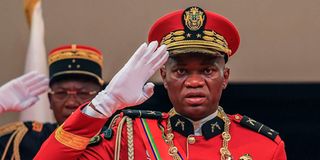
Gabon's strongman General Brice Oligui Nguema salutes as he is inaugurated as Gabon's interim President, in Libreville on September 4, 2023.
Gabon’s junta is turning to France, a former colonial master accused of directing political events in the African country, for help.
It has come nine months after the junta seized power in a bloodless coup in Gabon and got suspended by the African Union for it.
General Brice Clotaire Oligui Nguema, the country’s transitional leader, has turned to the former colonial master as he seeks funds to finance the national transition development plan and steer his political ambitions. Doing that could also place him at the centre of events and make him the leader for some time.
It is a quick turn-around for a man who portrayed military might even in international travel, including showing up in fatigues and a pistol tacked to his hip at the presidential palace in Kinshasa.
Last week, the junta leader rounded off a five-day visit to France on Sunday, wearing Western-style suits. During his stay in Paris, General Oligui Nguema chaired the first edition of the Gabon-France economic forum on Wednesday last week before having a tête-à-tête with the French President, Emmanuel Macron, on Friday evening at the Elysée, the official residence of the President of the French Republic.
At the economic forum attended by over 600 investors from both countries, the junta leader presented his vision of a new Gabon - one that aspires to revitalise its partnership and establish new links with French authorities.
“We are before you to invite you to Gabon, land of all opportunities,” Oligui Nguema told the business leaders on Wednesday, May 29, at the Salons Hoche in Paris, a 19th-century-style venue for business events in France. “Gabon now offers investment security, thanks to the efforts made to protect foreign investment and fight corruption,” he said.
A former head of the Republican Guards, an elite unit of the country's military, Oligui Nguema, was swiftly sworn in as transitional president following a coup that deposed his cousin, President Ali Bongo Ondimba, who had ruled the country since succeeding his father, Omar Bongo in 2009.
Bongo Snr had ruled the central African country, which is rich in natural resources, including timber and crude oil, for almost 42 years until he died in 2009. At the time of the August 2023 coup, Bongo Jnr had been declared the winner of an election that would have seen him extend his 14-year rule and turn Gabon into a monarchy.
Justifying the putsch to the French authorities and business community, Oligui Nguema said he was not a coup d’état but “a national liberation of the Gabonese people” from the dynastic rule of the Bongo family he accused of cosying up to foreign firms, including from France to mismanage national resources.
Gabon is one of the few African countries to have given loans to France in the past, but the Bongo clan’s decades in charge saw the country become an aid recipient despite the massive resources.
In France, at a forum organised by the Movement of the Enterprises of France (Medef) International, a private network of entrepreneurs and the largest employer federation in the country, and Gabon’s National Agency for Investments Promotion (ANPI-Gabon), the Gabonese delegation mobilised over €1billion ($1.1 billion) to revitalise the country with two memoranda of understanding signed in the presence on the junta leader.
The Gabonese Minister of the Economy, Mays Mouissi, and the French Minister Delegate for Foreign Trade, Franck Riester, signed two protocols of principle of participation relating to the repair of the Transgabonais railway and the rehabilitation of the saturated landfill of Mindoubé, according to French media, Le Monde. There were no other specifications because the two were just declarations of intent.
Some seven more documents were signed between French and Gabonese companies in varied domains, including port, railway, electricity, trade and road infrastructure.
French companies operate on 25 per cent of the Gabonese market and remain vital partners in revitalising the former French colony on the Atlantic Ocean, according to a dispatch.
However, relations between Libreville and Paris were said to have deteriorated under Ali Bongo. The French-speaking central African country turned towards London and joined the Commonwealth of Nations in 2022. Gabon, Togo, Rwanda and Mozambique are the only countries never colonised by the British to join the Commonwealth.
Bongo said in 2022 that Gabon was getting ready to break through with a new chapter by joining the English-speaking club, which he described as “a world of opportunities for Gabon on the economic, diplomatic and cultural levels.”
This is perhaps why he chose to address the international community in English while under house arrest in August last year when he called for people to “make some noise.”
His trip to France could be good news for a former colonial master whose influence in Africa has been waning as juntas take over former colonies and blame Paris for helping install political stooges in the past. Mali, Burkina Faso and Niger have all seen coups and immediately cut strong ties with France.
Also Read: What roles does the AUC chairperson perform?
Nguema, 49, has not publicly attacked the French government. It could make him l'enfant chérie (the dearest child) of Paris, especially since it lacks an avenue in Africa within which it can market itself abroad.
The African Union suspended all coup plotters but curiously ignored Chad’s coup in April 2021.
The continental body has maintained silence on Chad, whose elections last month were widely seen as flawed yet endorsed by France and the US.
Former military transition leader, General Mahamat Idriss Deby Itno, 40, was sworn in as Chad’s seventh president on May 23 after the country’s Constitutional Council validated his victory in the disputed poll conducted 17 days earlier. It marked the end of three years of military transitional rule and a return to democratic order in the country.
Mahamat Deby expeditiously assumed the country’s topmost office after his father, Idriss Deby Itno, who had ruled the country for over 30 years, was assassinated on the battlefront, just days after he had won back a new term in elections in April 2021.
Deby, the son, immediately suspended the constitution and established a transitional military council, which was technically a coup as the constitution provided succession plans in case a president died in office.
Coincidentally, the AU is headed by Chadian diplomat and former Foreign Minister Moussa Faki Mahamat. He said the African Union Peace and Security Council had asked Mahamat Deby not to run, and when he ignored it, it placed an embargo on Chadian elections.
In Gabon, the junta suspended the constitution of March 26, 1991, which established the democratic regime in the country and dissolved all democratic institutions created under the same law.
Unlike in Chad and Burkina Faso, Oligui Nguema has said he will respect the set transition timeline with work on a new constitution underway after an all-inclusive national dialogue in the country in April. He may not necessarily heed AU’s call not to run, though.

